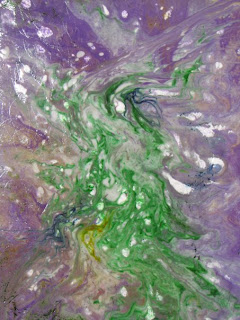 As it stands now, Art Therapy is not considered an "evidence-based" therapy - at least not here in Seattle. Evidence-based practice (also called empirically-supported treatment) is an intervention which has been shown empirically to have a significant effect as a treatment for specific issues or illnesses.
As it stands now, Art Therapy is not considered an "evidence-based" therapy - at least not here in Seattle. Evidence-based practice (also called empirically-supported treatment) is an intervention which has been shown empirically to have a significant effect as a treatment for specific issues or illnesses.In my opinion, and as most other Art Therapists would likely agree - Art Therapy should be considered evidence based. I don't know if there has not been enough research, or if the research has not been "significant" enough, but I intend to get to the bottom of it.
I'd love to hear arguments/examples of how you have seen evidence of Art Therapy's effectiveness.
For my example I would like to provide a story from my first internship while at Pratt. It is by no means the only one I have, and perhaps I will ad more later on.
I was working at a preschool which comprised of many children who were on the Autism spectrum. There I did one-on-one therapy with a particularly low-functioning three year-old Autistic boy with a tendency to scratch, head-butt or hit. This child was almost completely non-verbal, but luckily, as an art therapist in training, I was being taught how to do therapy utilizing non-verbal communication. During our sessions I focused a lot on getting the child into his physical body in the hopes of helping to get some of his aggressive energies out. I did a lot of mirroring and simply tried to engage him. We worked a lot with modeling sand and toy animals and I would make the animal sounds according to the animal he was working with. Eventually he would have to make the sound of the animal before I would make the sound. In this way he learned to associate objects. His favorite sound for me to make was the elephant.
By the end of the year he went every session without any physical outburst. I worked with him for a year and by the end of the year the child was relating to me with lots of eye contact and was able to separate me from other teachers. Whenever he would see me he would make the sound of the elephant he loved to hear me make. This alone, I felt, was a huge accomplishment, as Autism by its definition is characterized by an impairment in the ability to relate and interact socially.
Not only was he relating to me, but by the end of the year his vocabulary had gone from one or two words to about fifty. I cannot take credit for his speech improvements, as he was seeing a Speech therapist during that year, but I truly believe that the work we did in our Art Therapy sessions only supported and enhanced his experiences in Speech Therapy. This boy's improvement in speech and relatedness are significant enough, in my opinion, to argue the importance of Art Therapy - but one year later I would discover something even more remarkable.
One year after I had stopped working with this boy (a huge one fourth of this boys life) I came back to the school, where he still attended. When I saw the boy his eyes immediately lit up and he made the elephant sound he had associated with me nearly TWO YEARS before. He had not only remembered me, but remembered the association he had given me. I found this to be an utterly astounding accomplishment.
I know that for this experience to be quantified as "evidence-based" I would have to take this child and eliminate all the variables that were involved in the form of other treatments and other people with whom he was working. If nothing else, however, this example could be used to argue the necessity of more research to be done on the effectiveness of Art Therapy. This boy had related to me and essentially "named" me and been able to do so in his long-term memory - something which he had not done with any other person in the school. So, I at least know that there was something significant in our relationship, and happen to believe that it had to do with the Art Therapy we did together.
I know it is a difficult thing to try and show empirically what is typically thought of as almost metaphysical, but with all the technology out there today I know there is something that can be done in research to help advocate for the efficacy of Art Therapy. Almost anyone who practices or has participated in Art Therapy knows it is extremely beneficial. My biggest argument in the case for Art Therapy (or any Creative Arts Therapy like Dance, Music, etc.) is that it is essentially a specialization in non-verbal communication within Psychotherapy. An expertise in non-verbal communication, to me, would obviously be most helpful with children or with people with acute mental illnesses who are so verbally guarded.
I think Western medicine is not as far along as we Art Therapists or other Creative Art Therapists would like to think. I think we still have a long way to go in the fight to be taken seriously as a substantial, psychotherapeutically relevant treatment. I, for one, look forward to working towards a day when Art Therapists are given the equal respect (and pay ;)) we deserve in the medical community.
No comments:
Post a Comment